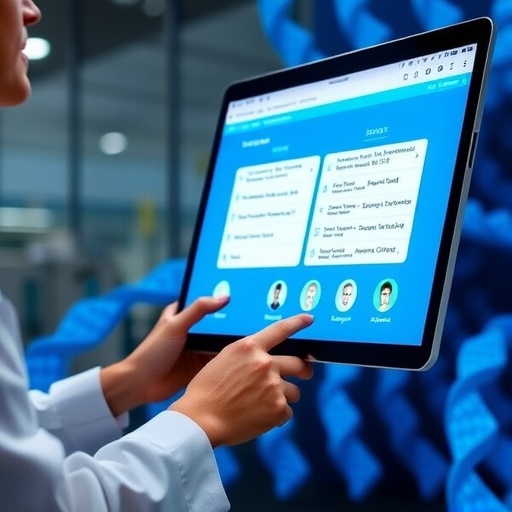In the rapidly evolving landscape of genetic medicine, a groundbreaking study titled “The MyCancerGene study” offers new insights into how digital health innovations can revolutionize patient care following cancer genetic testing. Published in the prestigious journal BMC Cancer, this research addresses the critical challenge of managing the increasing complexity of genetic testing through an innovative patient-centered digital genetic health portal. This portal not only aids patient understanding but also enhances clinical follow-up, fundamentally shifting the paradigm of precision medicine.
Cancer genetic testing has transitioned dramatically over recent years, moving from single-gene analysis to multi-gene panels and comprehensive whole-exome sequencing. While these advancements provide unprecedented detail about individual genetic risks, they also introduce layers of complexity that can overwhelm patients and providers alike. The MyCancerGene study recognizes the urgency of creating supportive, scalable tools to help patients navigate these complexities effectively over time.
At its core, this study is a Hybrid Type 1 effectiveness-implementation randomized trial aimed at evaluating how access to a digital genetic health portal impacts patient outcomes compared to traditional standards of care. Researchers hypothesize that the portal will significantly improve patients’ long-term understanding of their genetic results, ease the psychological burden often experienced post-testing, and encourage proactive health behaviors that reduce cancer risk.
One of the study’s pivotal objectives is to assess short-term and sustained changes in patient knowledge and anxiety after receiving genetic test results. The MyCancerGene portal is designed to deliver personalized information, empower communication between patients, their families, and healthcare providers, and foster engagement in preventive health measures. These components are especially critical in precision medicine, where genetic information must translate into meaningful clinical action.
The integration of a digital platform facilitates continuous patient engagement, vital given the uncertainty and evolving nature of genetic test interpretations. As new risk data emerges, patients need reliable, accessible channels to stay informed without the sometimes-limited availability of direct healthcare provider consultations. MyCancerGene fills this gap by offering an interactive, user-friendly interface tailored to patients’ educational and emotional needs.
Longitudinal follow-up in genetic medicine is a growing necessity due to the residual uncertainties inherent in interpreting complex genetic data. Unlike traditional one-time counseling, this study emphasizes an ongoing dialogue, enabled by digital connectivity, fostering a relationship between patients and their care teams that extends far beyond initial test disclosure. This continuum of care is essential to optimize outcomes in precision medicine.
The implementation aspect of the study is equally critical. Researchers are not solely gauging effectiveness but also investigating how the portal can be sustainably integrated into real-world clinical settings. By gathering stakeholder feedback, including from patients and healthcare providers, the study informs best practices for deployment, scalability, and future adaptation of digital health tools in genetic medicine.
A particularly innovative element of the MyCancerGene portal is its patient- and provider-informed design. Development involved extensive collaboration to ensure that content is not only scientifically accurate but also clinically relevant and emotionally supportive. This human-centered approach addresses a current gap in genetic medicine delivery, where many patients feel unprepared to interpret and act upon their genetic information.
Beyond individual patient benefits, this research has broad implications for healthcare systems struggling to keep pace with the rapid expansion of genetic technologies. The study’s findings could guide the creation of evidence-based practice guidelines that endorse longitudinal genetic care as a standard, potentially reshaping how genetic services are delivered globally.
In the era of precision medicine, where treatments and prevention strategies are tailored to individual genetic profiles, timely and accurate information delivery is imperative. MyCancerGene represents a beacon for integrating digital health innovations with genetic testing, promising to enhance the quality of care, patient satisfaction, and long-term health outcomes.
Ultimately, the success of MyCancerGene hinges on its ability to bridge the gap between genetic discoveries and real-world clinical applications. By offering a scalable, patient-friendly platform, the study envisions a future where genetic information catalyzes meaningful change in patient behavior and health trajectories, moving beyond static results to dynamic care partnerships.
Moreover, the trial registered under clinicaltrials.gov (NCT04774445) solidifies its commitment to rigorous, transparent investigation. This protocol ensures that outcomes will contribute valuable evidence for the ongoing evolution of precision medicine interventions in cancer care.
As healthcare increasingly embraces digital transformation, studies like MyCancerGene set a precedent for synthesizing technology, patient engagement, and scientific innovation. This fusion is vital to address the complex needs arising from the expansive and often nuanced data generated by modern genetic testing.
In conclusion, MyCancerGene exemplifies how digital health portals can be harnessed to enhance patient comprehension, emotional well-being, and proactive management of genetic risk. It posits a future where technology and personalized medicine coalesce, empowering patients and providers to collaboratively navigate the intricate terrain of cancer genetics.
Subject of Research: Patient-centered digital interventions in cancer genetic testing follow-up and precision medicine.
Article Title: The MyCancerGene study: a hybrid type 1 effectiveness-implementation randomized study comparing a patient-centered digital genetic health portal to usual care after receipt of cancer genetic testing.
Article References:
Chavez-Yenter, D., Fetzer, D., Egleston, B. et al. The MyCancerGene study: a hybrid type 1 effectiveness-implementation randomized study comparing a patient-centered digital genetic health portal to usual care after receipt of cancer genetic testing. BMC Cancer 25, 1642 (2025). https://doi.org/10.1186/s12885-025-14968-2
DOI: https://doi.org/10.1186/s12885-025-14968-2
Image Credits: Scienmag.com




